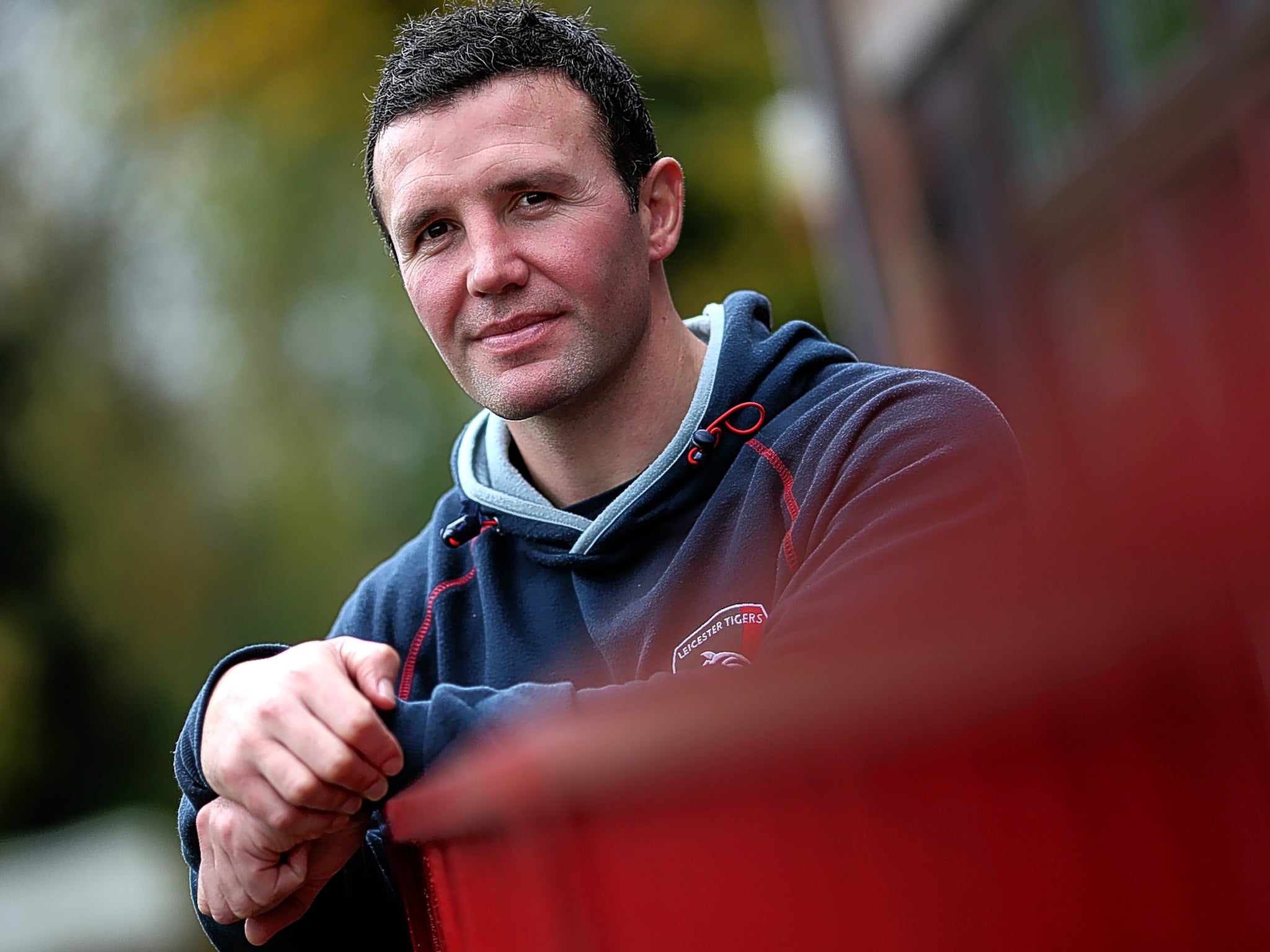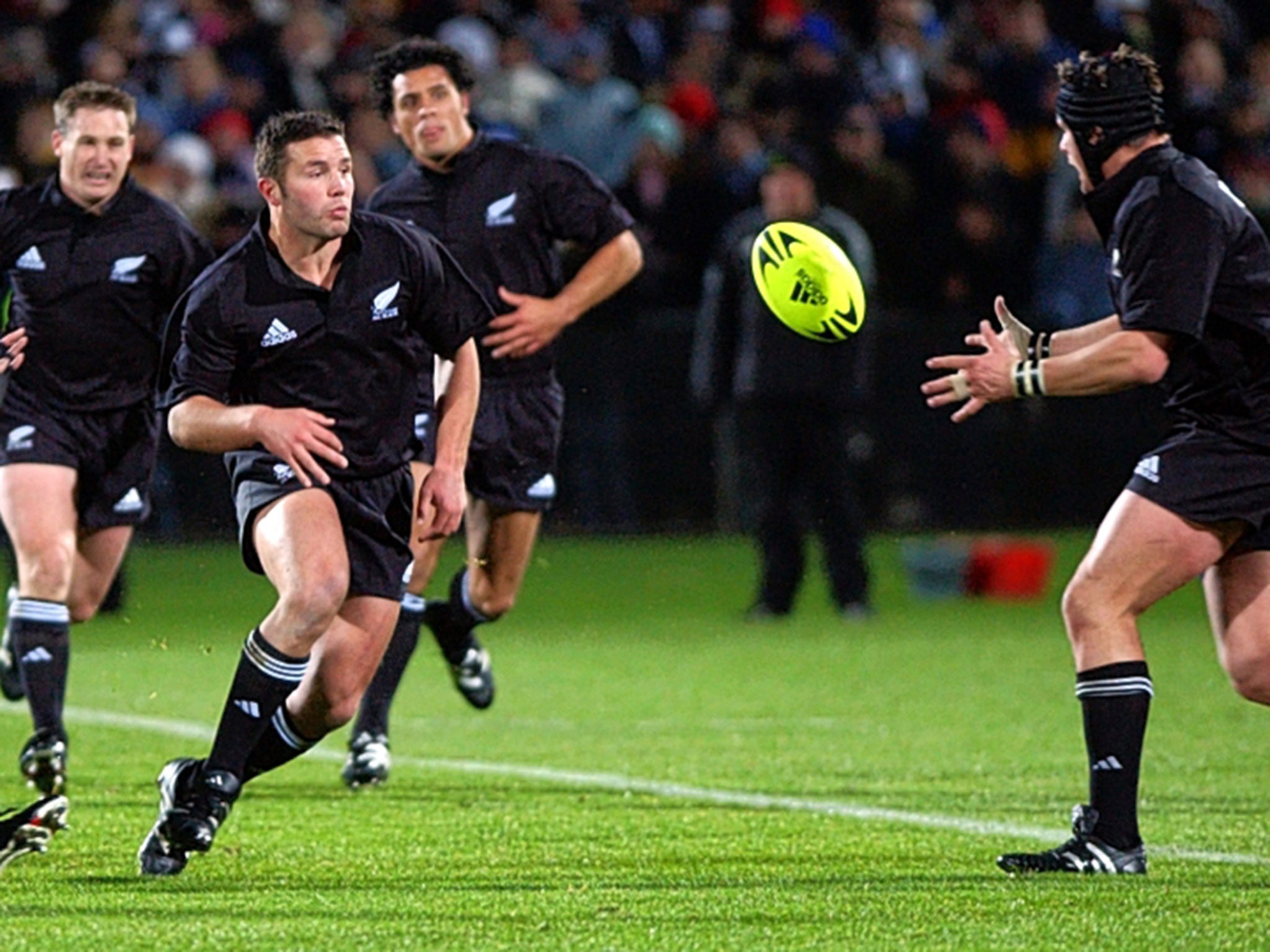Aaron Mauger: Bringing All Black quality to Leicester
Chris Hewett meets Mauger, the attack coach who is instilling an adventurous new approach in the Tigers’ game - just one part of the Antipodean transformation of English club rugby

Back in rugby’s age of innocence, when nobody felt the need to break the salary cap because there were no salaries and therefore no caps, the only must-have accessories for an ambitious team were a subsidised bar for the players, a free one for the committee and a set of floodlights that allowed training sessions after dark. Spool forward a quarter of a century and the essential add-ons are in human form… and they go by the name of Antipodeans.
New Zealand coaches, Australian coaches… you can barely walk down the union street without tripping over one. Nine of the 20 teams at this year’s World Cup were led by All Black and Wallaby types, and now that Eddie Jones, aka the Tasmanian Devil, has broken new ground as the first foreign boss of the England side, the takeover of the international game in the British Isles is complete.
Ten years ago, each of the four home nations had a home-grown coach in the top job: Andy Robinson in England, Eddie O’Sullivan in Ireland, Frank Hadden in Scotland, Mike Ruddock in Wales. If that seems like another epoch, it’s because it was. Jones is in a minority only in the sense that all three Celtic unions have a Kiwi running the show rather than an Aussie. How they must be loving it down there in Auckland and Sydney as local rugby lovers celebrate the triumph of reverse colonialism.
Two of the four Irish provinces, Ulster and Connacht, are under Antipodean control, as are the Llanelli-based Scarlets, where the New Zealander Wayne Pivac is head coach. A few miles down the road in Swansea, the Ospreys have Chris Gibbes of Waikato as their forwards strategist, while a long way up the road in Glasgow, the Australian defence coach Matt Taylor is an influential member of Gregor Townsend’s back-room staff.
And where the Celts lead, the English follow. When London Irish went hunting for a rugby director to replace Brian Smith of Australia, they recruited Tom Coventry of New Zealand. Gloucester? They have Laurie Fisher, a 57-year-old from Canberra, as head coach. Wasps? Their defence is run by Brad Davis, another Aussie, who spent several seasons at Bath before switching clubs.

You get the drift: this is not so much a trend as a cast-iron fact of life. And at the heart of it are Leicester. Supposedly the very definition of English rugby yeomanry – think Peter Wheeler and Dean Richards, Martin Johnson and Graham Rowntree – the Midlanders have been ahead of the field when it comes to buying in knowledge from the furthest-flung corner of the union landscape. If Bob Dwyer, Pat Howard and Matt O’Connor brought a Wallaby flavour to life at Welford Road in years gone by, it is now the turn of Aaron Mauger and Scott Hansen to give the place a makeover of the All Black variety.
They arrived together from the Canterbury Crusaders during the summer, Hansen to beef up the defence and Mauger to sprinkle some much-needed stardust over the former European champions’ lugubrious attacking game. And Mauger, a New Zealand Test centre of considerable repute who played for the Tigers after the 2007 World Cup before retiring with back trouble, is already the talk of the town, thanks to some unusually adventurous, distinctly un-Leicesterish performances with ball in hand.
“Like most northern hemisphere sides, we want to improve in attack,” says Richard Cockerill, the Leicester rugby director. “One way of doing that right now is to work out what teams like the Crusaders do. As Aaron was an architect of that, we felt he was just the man to make us better in the 25 per cent of the game that needs some work – the part where you have to manipulate the opposition. He hasn’t been here long, but I think everyone can see he’s made some progress.
“I think the southern hemisphere link has been the making of this club. We’re strong on identity here, but it’s equally important to know your limitations. I include myself in that. You have to put your ego to one side and accept that other people do certain things better than you do them.
“I can’t get the best out of a set of backs: I was a hooker, not a centre, I like scrums and breakdowns. Aaron is a different animal, someone with a different kind of understanding. He has the freedom to coach the way he wants to coach because he’s a perfect fit for us.
“Ultimately, I’m in charge because I’m the one who gets the blame when it goes wrong, but he’s a very big part of what we’re trying to do.”
Mauger won 46 Test caps between 2001 and 2007 and comes from prime sporting stock: he is a nephew of the Bachop brothers, Steve and Graeme, both of whom were All Blacks in the 1990s; his great uncle is Ivan Mauger, the six-time world speedway champion. In his pomp as a player, the man from Christchurch brought a clarity of thought and vision to the New Zealand midfield, and he is every bit as clear in his intentions at Welford Road.
“Sometimes your biggest strength can be your biggest weakness, and I think Leicester have been a classic case of that,” he says, acknowledging that the widespread perception of Leicester rugby as forward-dominated and innately conservative has a good deal of supporting evidence. “So the conversations when I first arrived centred around growing our game, of finding ways of moving the ball across the grass.
“It’s an interesting challenge and the good thing is that there’s been a big buy-in from the players. I’ve seen so much growth already, both in terms of skill improvement and approach, but we haven’t travelled even 50 per cent of the distance. There’s a hell of a lot of upside left, and that excites me.”
If he is not inclined to buy the popular argument that all southern hemisphere coaches pull the same rabbits from the same hat, Mauger does point to some common denominators. “I think it’s true to say that rugby people in New Zealand and Australia view the game in a particular way,” he says. “Maybe the playing conditions back home have an influence; whatever the truth of that, the important point to make is that the kids there grow up throwing the ball around and trusting their skills.
“We have no monopoly on playing exciting rugby: back in the early 2000s, the England team were at the cutting edge. But it seems to me that while we were always encouraged to try things and learn from our mistakes on the basis that you get the outcomes you want through practice and modification, the view up here in Europe tends to be that if you try something new and it doesn’t work, you automatically go back to what you know you do well.
“There’s also the game intelligence side – the ability to put things in a situational context and play on that basis. I was coached by Robbie Deans and Steve Hansen and Wayne Smith, people who believed that successful rugby had a general structure to it, but one that was open to variation. That’s as important for Leicester as it is for the All Blacks. We have Bath this weekend and Saracens coming up soon. We’d have to be pretty naive to play the same way against those two.”
Do the New Zealanders, world champions once again after a four-year cycle in which they lost just three matches, really bother to look hard at the other lot? Does it not demean a team of all the talents to waste time analysing opponents when they could be burnishing their own skills?
“The All Blacks may be good at making their decisions in the moment, rather than before the game starts, but it takes a lot of work to get there,” Mauger replies. “They win those key moments because they have individuals who know where the team is in its learning – and where the opposition are in their learning.”
Most followers of the English club game would be surprised to see a club as powerful and successful as Leicester reaching for the L-plates, but Mauger is determined to set new tests for his players. Eddie Jones is planning much the same thing for his England squad. If the right lessons are learned, the southern hemisphere’s raid on the northern job market will be no bad thing.
Join our commenting forum
Join thought-provoking conversations, follow other Independent readers and see their replies
Comments
Bookmark popover
Removed from bookmarks